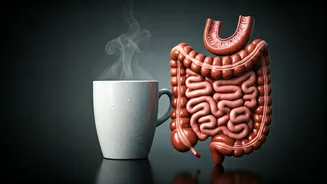Coffee's Digestive Impact
Coffee, a staple in many morning routines, often leads to a quick trip to the restroom for a significant portion of the population. This digestive effect
is not a myth; it's a real consequence of how coffee interacts with our bodies. It isn't just the caffeine that's responsible. Other compounds, some as-yet-unidentified, contribute to the stimulation of the bowels. For many, this stimulation is noticeable quickly, often within minutes of consuming coffee. This rapid response is a key reason why coffee is associated with a morning bathroom routine for many individuals across various demographics, making it more than just a beverage; it's a potential digestive trigger.
The Gastroenterological Perspective
Gastroenterologists have long studied the digestive effects of coffee. The scientific community is deeply engaged in unraveling how coffee influences our gut. Research indicates that coffee's impact isn't solely due to caffeine. While caffeine does stimulate the muscles in the colon, leading to more frequent contractions, other substances within coffee seem to accelerate this process. This blend of caffeine and other compounds contributes to the accelerated movement of food through the digestive tract. Some individuals are more sensitive than others to coffee's effects, and the intensity can vary from person to person. Thus, individual reactions further show the complexity of how coffee affects the human digestive system.
Caffeine's Role Explained
Caffeine, a well-known stimulant, plays a significant role in coffee's digestive effects. Caffeine stimulates the muscles within the colon, causing them to contract more frequently. These contractions are called peristalsis, and they push the contents of the digestive system forward. This process speeds up the movement of food. However, caffeine’s impact alone does not fully explain coffee's effect. Other compounds work alongside caffeine to increase this process. Therefore, while caffeine contributes to the urgency, the complete effect is more complex and depends on a mix of coffee compounds and individual characteristics.
Other Active Coffee Compounds
Beyond caffeine, coffee has several other active compounds that contribute to its impact on bowel movements. These compounds are a complex mixture, and scientists are still working to fully understand them. Research indicates that these compounds directly influence the digestive system, including the stomach and the small intestine. They affect the gut motility, meaning they influence the rate at which food moves through the digestive tract. These substances work together with caffeine to create a potent effect. The combination of these substances with caffeine is likely what causes some individuals to feel the effects of coffee rapidly. Thus, the exact blend varies from one type of coffee to another, further showing why results vary.
Individual Variability Explained
The response to coffee is not uniform; individual experiences vary greatly. Sensitivity to coffee’s effects is influenced by a range of factors. Genetic predispositions, lifestyle habits, and the overall health of the digestive system play important roles. Some people might find themselves running to the bathroom almost immediately, while others may experience little to no change. Also, the type and preparation of coffee also matter. Different roasting levels, brewing methods, and coffee bean origins affect the concentration of active compounds. For instance, cold brew coffee can have a different impact compared to an espresso. Therefore, understanding these variances helps manage the digestive response effectively.
Managing Coffee's Effects
If coffee's effect on your bowel movements bothers you, there are several things you can consider. Monitoring your coffee consumption helps; reducing the amount you drink might lessen the impact. Drinking coffee with food can slow down the digestive process, potentially reducing the urgency. Experiment with different types of coffee or brewing methods to see if this makes a difference. If you're sensitive, you may want to try alternatives like decaffeinated coffee. Decaf still contains some of the same compounds and can have a similar effect on the gut. Staying hydrated is also very important. Consulting a healthcare professional is always advisable if you have any serious concerns.











